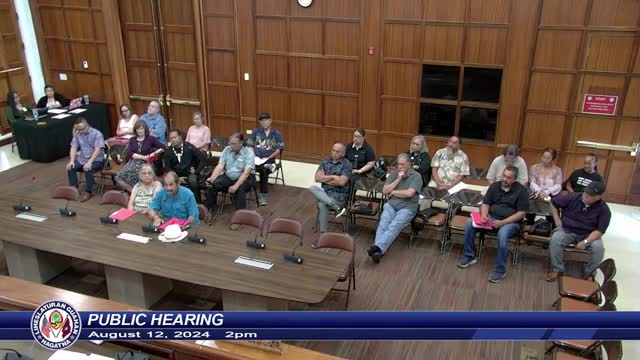Land Trust Faces Challenges Amid Commercial Encroachment
August 12, 2024 | Health, Land, Justice, and Culture , Legislative, Guam
This article was created by AI summarizing key points discussed. AI makes mistakes, so for full details and context, please refer to the video of the full meeting. Please report any errors so we can fix them. Report an error »

During a recent government meeting, significant discussions centered around the challenges faced by the Chamorro Land Trust Commission (CLTC) regarding property management and infrastructure funding. A board member expressed frustration over the perceived exploitation of CLTC properties by large businesses, describing the situation as one where commercial entities treat CLTC as a \"doormat.\" This sentiment underscores ongoing concerns about the lack of accountability for businesses that encroach on CLTC land.
In a proactive move, the CLTC entered a short-term lease agreement with the Guam Power Authority (GPA) for property adjacent to a power plant, generating approximately $200,000 over three years to support infrastructure projects. This financial infusion is seen as a crucial step towards addressing the commission's infrastructure needs.
The meeting also highlighted the complexities of managing tenant evictions. A board member, drawing on their real estate background, intervened during a planned eviction at a raceway, emphasizing the importance of adhering to legal processes to avoid unnecessary complications. This incident illustrates the board's commitment to maintaining operational integrity while navigating challenging situations.
Additionally, the board is actively working to resolve longstanding lease issues dating back to 2018, which have been complicated by changes in legal counsel and inconsistent advice. New legislative proposals from the Attorney General aim to address these challenges, with the board expressing hope that these measures will provide a pathway to resolution.
The meeting concluded with discussions on the need for robust communication and collaboration among board members and staff to ensure effective decision-making. The board remains focused on prioritizing the needs of licensed lessees and addressing the infrastructure demands of the community, particularly concerning residential leases and water infrastructure for 166 lots. As the board continues to navigate these issues, the importance of legislative support and community engagement remains paramount.
In a proactive move, the CLTC entered a short-term lease agreement with the Guam Power Authority (GPA) for property adjacent to a power plant, generating approximately $200,000 over three years to support infrastructure projects. This financial infusion is seen as a crucial step towards addressing the commission's infrastructure needs.
The meeting also highlighted the complexities of managing tenant evictions. A board member, drawing on their real estate background, intervened during a planned eviction at a raceway, emphasizing the importance of adhering to legal processes to avoid unnecessary complications. This incident illustrates the board's commitment to maintaining operational integrity while navigating challenging situations.
Additionally, the board is actively working to resolve longstanding lease issues dating back to 2018, which have been complicated by changes in legal counsel and inconsistent advice. New legislative proposals from the Attorney General aim to address these challenges, with the board expressing hope that these measures will provide a pathway to resolution.
The meeting concluded with discussions on the need for robust communication and collaboration among board members and staff to ensure effective decision-making. The board remains focused on prioritizing the needs of licensed lessees and addressing the infrastructure demands of the community, particularly concerning residential leases and water infrastructure for 166 lots. As the board continues to navigate these issues, the importance of legislative support and community engagement remains paramount.
Don't Miss a Word: See the Full Meeting!
Go beyond summaries. Unlock every video, transcript, and key insight with a Founder Membership.
✓
Get instant access to full meeting videos
✓
Search and clip any phrase from complete transcripts
✓
Receive AI-powered summaries & custom alerts
✓
Enjoy lifetime, unrestricted access to government data
30-day money-back guarantee
